VEGA仪表安装详细说明
德国VEGA物位计显示调整模块 中文使用说明

一 PLICSCOM显示调试模块设置1.1 概述功能/设置显示调试模块PLICSCOM用于测量显示、调整和测试,可安装于下列封装外壳和仪器中:●plics®系列传感器的所有单室壳体和双室壳体;●外置的显示调试单元VEGADIS61;从PLICSCOM的硬件版本…-01开始及其传感器,可以通过调试菜单设置背光显示。
硬件的版本号标示在PLICSCOM的标签上或传感器的电子部件中。
提示:此功能是用于带有安全许可的仪表,如:StEx、WHG或船用许可,以及FM、CSA等一些即将实施的国家专用许可。
备注:您可以在显示调试模块PLICSCOM的操作指引手册中获得详细的资料。
1.2 显示调试模块的安装装卸显示调试模块显示调试模块可随时装卸,装卸可带电操作,无需关闭供电电源。
安装步骤如下:1、旋开外壳面盖;2、把显示调试模块放入电子面板上(你可选择四种不同的方位,每个方位相差90°)3、压紧显示调试模块并顺时针转动,直至模块卡紧到位;4、装回带观察视窗的外壳面盖并旋紧。
拆卸方法则是上述步骤的反操作。
显示调试模块直接由传感器供电,无需连接额外的电源。
图26 显示调试模块安装示意图备注:如果您是在原有的VEGAPULS63上增加显示调试模块用于连续测量显示,将需要配置一个加高的带观察视窗的面盖。
1.3 系统调试图27 显示和调试部件1、液晶显示屏2、菜单编号显示3、调试按键按键功能●[OK] 按键:-返回到菜单首项-确认所选菜单-编辑参数-保存设置●[►]按键选择:-菜单选择-列出选项-位置编辑●[+]按键:-改变参数值●[ESC] 按键:-中断输入-返回上一层菜单系统调试传感器通过显示调试模块的四个按键作调整,液晶屏显示各个菜单选项,各个按键的功能如上所述。
在停止按键10分钟后,模块将会自动回复到显示测量值状态。
任何没有以[OK]键确认的设置将不会保存。
1.4 设置的步骤HART-Multidrop地址设置在HART-Multidrop模式(一个输入设置多个传感器),必须首先设置地址,然后才能作参数调整。
VEGA射空雷达液位计使用说明
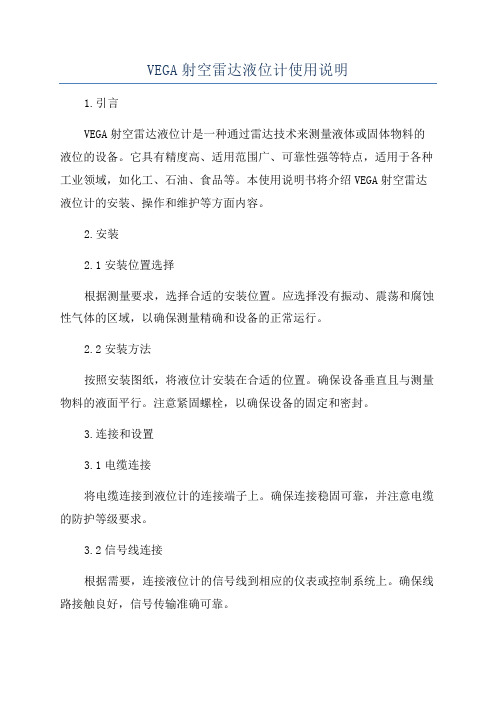
VEGA射空雷达液位计使用说明1.引言VEGA射空雷达液位计是一种通过雷达技术来测量液体或固体物料的液位的设备。
它具有精度高、适用范围广、可靠性强等特点,适用于各种工业领域,如化工、石油、食品等。
本使用说明书将介绍VEGA射空雷达液位计的安装、操作和维护等方面内容。
2.安装2.1安装位置选择根据测量要求,选择合适的安装位置。
应选择没有振动、震荡和腐蚀性气体的区域,以确保测量精确和设备的正常运行。
2.2安装方法按照安装图纸,将液位计安装在合适的位置。
确保设备垂直且与测量物料的液面平行。
注意紧固螺栓,以确保设备的固定和密封。
3.连接和设置3.1电缆连接将电缆连接到液位计的连接端子上。
确保连接稳固可靠,并注意电缆的防护等级要求。
3.2信号线连接根据需要,连接液位计的信号线到相应的仪表或控制系统上。
确保线路接触良好,信号传输准确可靠。
3.3参数设置根据实际需求,在仪表或控制系统中设置相应的参数,例如液位单位、量程范围等。
确保参数设置正确,以保证液位计的准确测量和报警功能的正常使用。
4.操作4.1启动和停止在保证相应的电源和系统连接的情况下,按下液位计的启动开关,设备将开始正常运行。
在需要停止设备时,关闭相应的电源和系统连接。
4.2备份电源液位计通常带有备份电源功能。
在主电源故障或断电时,备份电源将自动启动,确保设备的正常工作。
当主电源恢复后,备份电源将自动转为主电源。
4.3液位测量液位计将通过射空雷达技术测量液体或固体的液位。
它能够测量各种介质,如水、油、粉末等。
根据实际情况选择合适的测量模式,确保测量的准确性。
5.维护5.1定期检查定期检查液位计以确保其正常运行。
包括检查电缆连接是否松动、清理传感器、检查密封件是否完好等。
5.2清洁液位计的传感器表面可能会沾上污垢。
定期使用干净的布或软刷清洁传感器表面,以保证测量的准确性。
5.3校准根据需要,定期校准液位计,以确保测量结果准确可靠。
校准可以通过仪表或控制系统进行,可以根据操作手册进行操作。
vegaCAP60中文操作说明书

4.3.3 晶体管输出接线
电子部件和接线部分
1 电位计,用于调整开关点 2 DIL-开关,用于选择测量范围 3 DIL-开关,用于转换工作方式 4 接地端子 5 接线端子 6 控制灯 接线图 我们建议,开关电路在位式报警、导线断路或故障报警的情况下为开 路(安全状态)。 用于控制继电器、接触器、电磁阀、光电报警、喇叭以及 PLC 的输入。
LED 显示灯用于显示开关状态(绿色/红色) 用于调整开关点的电位计 DIL-开关,用于选择测量范围 DIL-开关,用于选择工作方式
3 安装 3.1 一般介绍
VEGACAP60系列可以安装在任何位置上。仪表安装时必须使测量电 极可以达到需要的开关点位置。
在进行焊接之前,首先要将电子部件拆下来,防止由于电感耦合损伤 电子部件。
注意: 一般情况下,需要在启动仪表之前设定好工作方式,否则会改变开关 输出。
5.1.1 调试元件 继电器输出
1 电位计,用于调整开关点 2 DIL-开关,用于选择测量范围 3 DIL-开关,用于转换工作方式 4 接地端子 5 接线端子 6 控制灯
无触点开关
1 电位计,用于调整开关点 2 DIL-开关,用于选择测量范围 3 DIL-开关,用于转换工作方式 4 接地端子 5 接线端子 6 控制灯
晶体管输出
1 电位计,用于调整开关点 2 DIL-开关,用于选择测量范围 3 DIL-开关,用于转换工作方式 4 接地端子 5 接线端子 6 控制灯
设定开关点(1) 测量范围选择开关(2) 转换工作方式(3) 控制灯(3)
开关点设定 工作方式(最大或最小)
通过这个电位计可以设定开关点。VEGACAP60 系列出厂时,这个电 位计处于中间位置。 如果需要把它调得不灵敏些,可以顺时针旋转。这样做是为了测量介 电常数大的介质,比如:水。 如果需要把它调得灵敏些,可以逆时针旋转。这样做是为了测量介电 常数小的介质,比如:油。
vega雷达物位计说明书
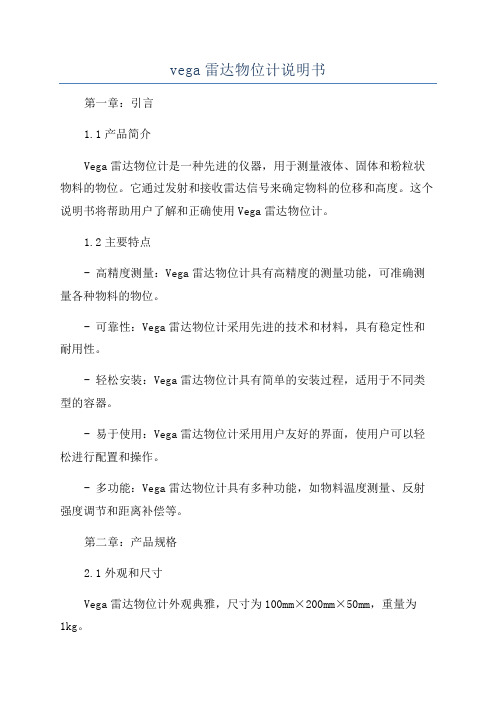
vega雷达物位计说明书第一章:引言1.1产品简介Vega雷达物位计是一种先进的仪器,用于测量液体、固体和粉粒状物料的物位。
它通过发射和接收雷达信号来确定物料的位移和高度。
这个说明书将帮助用户了解和正确使用Vega雷达物位计。
1.2主要特点- 高精度测量:Vega雷达物位计具有高精度的测量功能,可准确测量各种物料的物位。
- 可靠性:Vega雷达物位计采用先进的技术和材料,具有稳定性和耐用性。
- 轻松安装:Vega雷达物位计具有简单的安装过程,适用于不同类型的容器。
- 易于使用:Vega雷达物位计采用用户友好的界面,使用户可以轻松进行配置和操作。
- 多功能:Vega雷达物位计具有多种功能,如物料温度测量、反射强度调节和距离补偿等。
第二章:产品规格2.1外观和尺寸Vega雷达物位计外观典雅,尺寸为100mm×200mm×50mm,重量为1kg。
2.2技术指标-测量范围:0-20米- 准确度:±2mm-工作温度:-40°C至85°C-电源:220VAC或24VDC- 输出信号:4-20mA或Modbus RS485第三章:安装与操作3.1安装步骤1)在容器上选择一个合适的位置进行安装。
2) 使用提供的安装配件将Vega雷达物位计固定在容器上。
3)连接电源和信号线。
3.2配置与校准1) 打开Vega雷达物位计的电源。
2)进入配置模式,通过菜单进行参数设置,如温度单位、物料类型等。
3)进行校准,按照说明书中给出的步骤进行操作。
3.3操作与维护1) 使用人员应熟悉Vega雷达物位计的各项功能和操作方式。
2) 定期检查和维护Vega雷达物位计,确保其正常运行。
3) 避免将Vega雷达物位计暴露在恶劣的环境中,以免损坏设备。
第四章:故障排除4.1常见问题与解决方法-问题:无法正常启动解决方法:检查电源连接是否正确,重新插拔电源线。
-问题:测量结果不准确解决方法:检查安装是否正确,进行重新校准。
VEGA操作说明
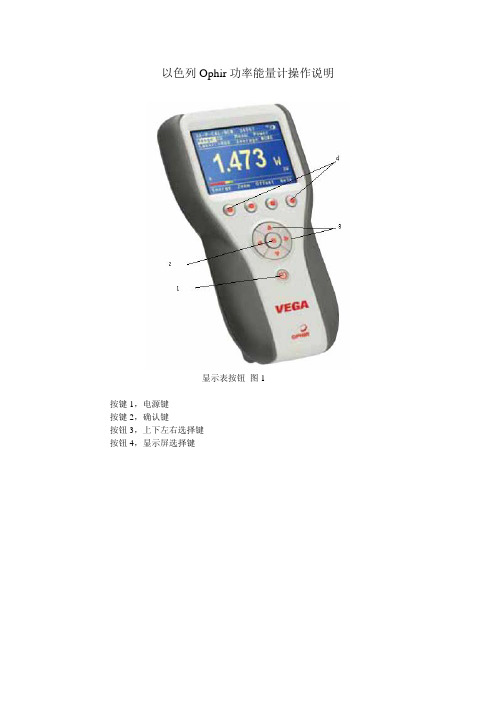
以色列Ophir功率能量计操作说明显示表按钮图1按键1,电源键按键2,确认键按钮3,上下左右选择键按钮4,显示屏选择键显示菜单图2,1,能量或功率量程选择2,波长选择3,功能菜单(在图3中将给出详细介绍)4,测试时间设置(时间越长波动越小,但是对较快的频率且能量变化较大的测量不利,建议默认设置)5,衰减片设置,OUT为带衰减片,IN为不带衰减片6,激光脉宽选择,有两个值可选,选择较小的值表示激光脉宽小于该值,选择较大的值表示激光脉宽大于较小的值,例如,有个表头有1ms和3ms两个脉宽,如果选择1ms,则表示要测量的激光脉宽小于1ms,脉冲宽度大于1ms,选择3ms。
7,更改显示屏幕颜色(7种颜色)8,功率/能量测试切换(华光公司订购的为能量探头,无此切换功能)9,显示探头型号和序列号设置菜单图31,能量或功率选择2,指针式显示3,设置一段时间测量,例如10秒内测量,时间到了就停止4,数据存储5,归一化显示6,测能量密度,需要输入光斑大小7,衰减设置8,测试上下限设置9,连接示波器设置10,系统参数11,清零12,校正设置(千万不要更改本设置,否则测量能量值不再准确)13,仪器参数备注:该显示表菜单会根据连接的探头不同而显示不同显示表接头图4 1,电源2,模拟输出3,探头接口4,电脑接口仪器使用步骤1.在不接探头的情况下,按下图1电源键“1”,约3秒开机。
2.在不连接探头的请款下开机并按图1中Zero清零,约1分钟后按save键完成后退出并关机。
3.关机后,连接所需要的探头,开机。
按图3中的Zero清零,完成后按save键存储。
回到图2所示的界面中,更改激光波长及能量量程(建议待测能量>10%能量量程)就可以开始测量。
4,完成后按图1电源键“1”关机。
软件使用注意事项:先安装光盘内软件,然后把表连接电脑。
具体操作见说明书。
注意事项:1.在开始使用能量计前,请先大概估算一下激光的能量密度是否会超过能量探头的损伤阈值(具体指标见探头参数),如果不好估算,可以先使用随探头所附的能量测试片测试一下激光,如果测试片没有被打坏,则可以使用能量探头进行测试。
vega雷达液位计说明书中文版
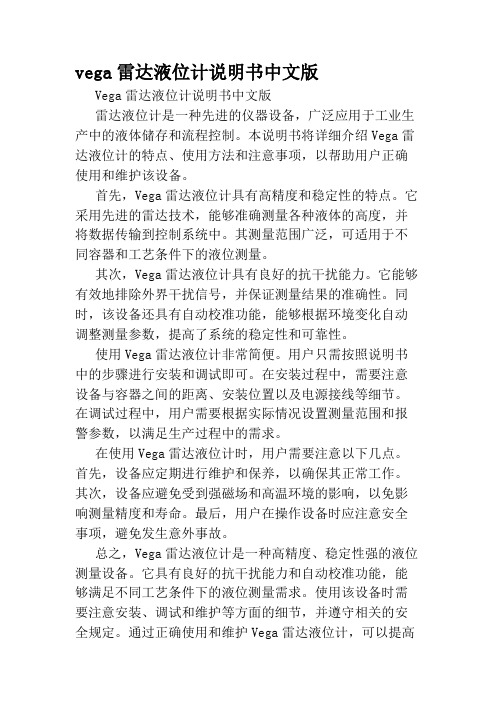
vega雷达液位计说明书中文版Vega雷达液位计说明书中文版雷达液位计是一种先进的仪器设备,广泛应用于工业生产中的液体储存和流程控制。
本说明书将详细介绍Vega雷达液位计的特点、使用方法和注意事项,以帮助用户正确使用和维护该设备。
首先,Vega雷达液位计具有高精度和稳定性的特点。
它采用先进的雷达技术,能够准确测量各种液体的高度,并将数据传输到控制系统中。
其测量范围广泛,可适用于不同容器和工艺条件下的液位测量。
其次,Vega雷达液位计具有良好的抗干扰能力。
它能够有效地排除外界干扰信号,并保证测量结果的准确性。
同时,该设备还具有自动校准功能,能够根据环境变化自动调整测量参数,提高了系统的稳定性和可靠性。
使用Vega雷达液位计非常简便。
用户只需按照说明书中的步骤进行安装和调试即可。
在安装过程中,需要注意设备与容器之间的距离、安装位置以及电源接线等细节。
在调试过程中,用户需要根据实际情况设置测量范围和报警参数,以满足生产过程中的需求。
在使用Vega雷达液位计时,用户需要注意以下几点。
首先,设备应定期进行维护和保养,以确保其正常工作。
其次,设备应避免受到强磁场和高温环境的影响,以免影响测量精度和寿命。
最后,用户在操作设备时应注意安全事项,避免发生意外事故。
总之,Vega雷达液位计是一种高精度、稳定性强的液位测量设备。
它具有良好的抗干扰能力和自动校准功能,能够满足不同工艺条件下的液位测量需求。
使用该设备时需要注意安装、调试和维护等方面的细节,并遵守相关的安全规定。
通过正确使用和维护Vega雷达液位计,可以提高生产效率、降低成本,并确保生产过程的安全性和稳定性。
VEGASON65安装手册(中文)

VEGASON 65安装操作手册
图1
1 物料满仓
2 物料空仓
3 物位计测量范围
4 测量基本参考点(从探头下沿开始计算,与物料满仓之间必须有一定距离)
图2
1 安装位置与仓壁最小距离为50MM
图3 为物位计在不同环境下的安装方法:
图3
图4 请按图示连接:
1 物位计电气单元
2 连接插头
3 物位计连接管
图5 物位计电气单元内部
图6 图6为物位计电子单元内部接线示意图
V——四线制4-20mA/HART
图7
图8 图7和图8为物位计外观尺寸图,请参照具体式样选择相应图片
注:本款物位计详细参数为
B——一体化带万向节
AS——DN50万向节法兰。
VEGA 雷达级量仪产品说明书
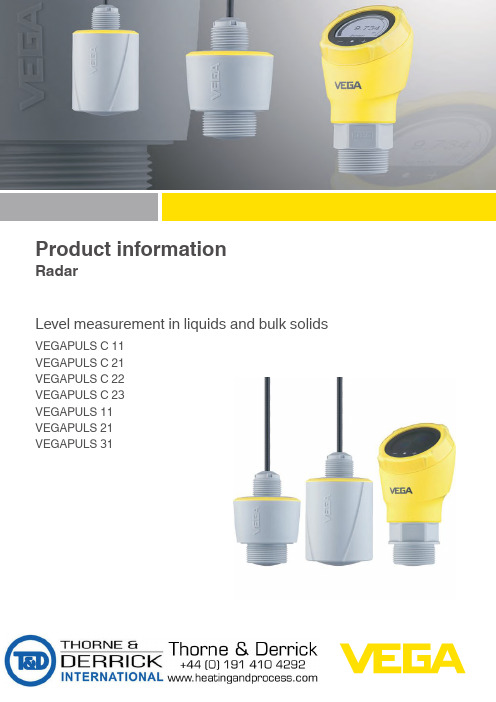
Product informationRadarLevel measurement in liquids and bulk solids VEGAPULS C 11VEGAPULS C 21VEGAPULS C 22VEGAPULS C 23VEGAPULS 11VEGAPULS 21VEGAPULS 3158365-EN-220218Contents1 Measuring principle ...............................................................................................................................................................................................32 T ype overview .........................................................................................................................................................................................................43 Instrument selection ..............................................................................................................................................................................................64 Mounting .................................................................................................................................................................................................................75 Electronics - T wo-wire 4 ... 20 mA ........................................................................................................................................................................96 Electronics - T wo-wire 4 ... 20 mA/HART ...........................................................................................................................................................107 Electronics - SDI-12 .............................................................................................................................................................................................118 Electronics - Modbus ...........................................................................................................................................................................................129 Adjustment ...........................................................................................................................................................................................................1310 Dimensions .. (14)T ake note of safety instructions for Ex applicationsPlease note the Ex specific safety information that you can find at and that comes with each instrument. In hazardous areas you should take note of the appropriate regulations, conformity and type approval certificates of the sensors and power supply units. The sen -sors must only be operated on intrinsically safe circuits. The permissible electrical values are stated in the certificate.Measuring principle58365-E N -2202181 Measuring principleMeasuring principleThe devices emit a continuous radar signal through their antennas. The emitted signal is reflected by the medium and received as an echo by the antenna.The frequency difference between the emitted and received signal is proportional to the distance and depends on the filling height. The determined filling height is converted into a respective output signal and output as measured value.80 GHz technologyThe 80 GHz technology used enables a unique focusing of the radar beam and a wide dynamic range of the radar sensors. The greater the dynamic range of a radar sensor, the wider its application spectrum and the higher its measurement reliability.AdvantagesNon-contact radar technology is characterized by extremely high meas -urement accuracy. The measurement is influenced neither by fluctuating product features nor by changing process conditions such as tempera -ture, pressure or strong dust generation. The user-friendly adjustment without vessel filling and emptying saves time.Input variableThe measured variable is the distance between the antenna edge of the sensor and the medium surface. The antenna edge is also the reference1 Reference plane2Measured variable, max. measuring range58365-EN-2202182 T ype overviewVEGAPULS C 11VEGAPULS C 21VEGAPULS C 22ApplicationsWater processing, pump stations, storm water overflow tank, level monitoring Water processing, pump stations, storm water overflow tank, flow measurement in open flumes, level monitoring Water processing, pump stations, storm water overflow tank, flow measurement in open flumes, level monitoring Max. measuring range 8 m (26.25 ft)15 m (49.21 ft)15 m (49.21 ft)Antenna/Material Integrated antenna system/PVDF encap -sulated Integrated antenna system/PVDF encap -sulated Integrated antenna system/PVDF encap -sulated Beam angle 8°8°8°Process fitting MaterialG1½, 1½ NPT , R1½PVDF G1½, 1½ NPT , R1½PVDF G1½, 1½ NPT , R1½PVDFConnection for mounting strapG1, 1 NPT , R1G1, 1 NPT , R1G1½, 1½ NPT , R1½ Process temperature -40 … +60 °C-40 … +140 °F)-40 … +80 °C(-40 … +176 °F)-40 … +80 °C(-40 … +176 °F)Process pressure -1 … +3 bar/-100 … +300 kPa (-14.5 … +43.51 psi)-1 … +3 bar/-100 … +300 kPa (-14.5 … +43.51 psi)-1 … +3 bar/-100 … +300 kPa (-14.5 … +43.51 psi) Deviation ≤ 5 mm ≤ 2 mm ≤ 2 mm Frequency range W-bandW-bandW-bandSignal output•T wo-wire 4 … 20 mA• T wo-wire 4 … 20 mA/HART • SDI-12• Modbus• T wo-wire 4 … 20 mA/HART • SDI-12• ModbusCommunication interface BluetoothBluetoothBluetoothIndication/Adjustment -/Via app on smartphone or tablet andBluetooth -/Via app on smartphone or tablet and Bluetooth-/Via app on smartphone or tablet and BluetoothApprovals 1)-• c-UL-us, EAC, RCM • ATEX/IEC • EAC/SEPRO• NEPSI/CCOE/TIIS/KOSHA •INMETRO/IA• c-UL-us, EAC, RCM • ATEX/IEC • EAC/SEPRO• NEPSI/CCOE/TIIS/KOSHA •INMETRO/IA1)Available or applied forT ype overview58365-E N -220218VEGAPULS C 23VEGAPULS 11VEGAPULS 21VEGAPULS 31Water processing, pump stations, storm water overflow tank, flow measurement in open flumes, level monitoring Water treatment, storage tanks in all industrial areas, plastic tanks (meas -urement through the tank wall)Water treatment, storage tanks in all industrial areas, plastic tanks (meas -urement through the tank wall)Water treatment, storage tanks in all industrial areas, plastic tanks (meas -urement through the tank wall)30 m (98.43 ft)8 m (26.25 ft)15 m (49.21 ft)15 m (49.21 ft)Integrated antenna system/PVDF en -capsulated Integrated antenna system/PVDF en -capsulated Integrated antenna system/PVDF en -capsulated Integrated antenna system/PVDF en -capsulated 4°8°8°8°-G1½, 1½ NPT , R1½PVDFG1½, 1½ NPT , R1½PVDFG1½, 1½ NPT , R1½PVDFG1, 1 NPT , R1G1½, 1½ NPT , R1½G1½, 1½ NPT , R1½G1½, 1½ NPT , R1½-40 … +80 °C (-40 … +176 °F)-40 … +60 °C -40 … +140 °F)-40 … +80 °C (-40 … +176 °F)-40 … +80 °C (-40 … +176 °F)-1 … +3 bar/-100 … +300 kPa (-14.5 … +43.51 psi)-1 … +3 bar/-100 … +300 kPa (-14.5 … +43.51 psi)-1 … +3 bar/-100 … +300 kPa (-14.5 … +43.51 psi)-1 … +3 bar/-100 … +300 kPa (-14.5 … +43.51 psi)≤ 2 mm ≤ 5 mm ≤ 2 mm ≤ 2 mm W-bandW-bandW-bandW-band• T wo-wire 4 … 20 mA/HART • SDI-12•Modbus•T wo-wire 4 … 20 mA•T wo-wire 4 … 20 mA/HART•T wo-wire 4 … 20 mA/HARTBluetoothBluetoothBluetoothBluetooth-/Via app on smartphone or tablet and Bluetooth-/Via app on smartphone or tablet and Bluetooth -/Via app on smartphone or tablet and BluetoothIntegrated display and adjustment unit/Via app on smartphone or tablet and Bluetooth• c-UL-us, EAC, RCM • ATEX/IEC • EAC/SEPRO• NEPSI/CCOE/TIIS/KOSHA •INMETRO/IA-• c-UL-us, EAC, RCM • ATEX/IEC • EAC/SEPRO• NEPSI/CCOE/TIIS/KOSHA •INMETRO/IA• c-UL-us, EAC, RCM • ATEX/IEC • EAC/SEPRO• NEPSI/CCOE/TIIS/KOSHA •INMETRO/IA58365-EN-2202183 Instrument selectionApplication areaThe radar sensors of the VEGAPULS 10, 20, 30 series described here are used for non-contact level measurement of liquids and bulk solids. They can be used in both simple and aggressive liquids. The sensors also measure light and heavy bulk solids absolutely reliably, both with strong dust and noise generation and independent of buildup or conden -sation.Device overview VEGAPULS C 11VEGAPULS C 11 is the ideal sensor for non-contact level measurement in simple applications where a high degree of protection is required. It is particularly suitable for use in water treatment, pumping stations, rain overflow basins and level monitoring.VEGAPULS C 21, C 22, C 23VEGAPULS C 21, C 22, C 23 are the ideal sensors for non-contact level measurement in simple applications where a high degree of protection is required. They are particularly suitable for use in water treatment,pumping stations and rain overflow basins, for flow measurement in open channels and level monitoring.VEGAPULS 11, 21, 31VEGAPULS 11, 21, 31 are the ideal sensors for non-contact level measurement in simple applications. They are particularly suitable for use in water treatment, storage tanks with acids, lyes and additives in all industrial areas, or for measuring levels in plastic tanks from the outside through the tank wall.Configuration and housing protection classesThe radar sensors of series VEGAPULS 10, 20, 30 are available in differ -ent designs, housing protection classes and connection techniques. The following illustrations show typical examples.1 Radar antenna2 Process fitting3 Electronics housing4 Counter nut5 Mounting thread 6Connection cableIP66/IP68 (3 bar)1 Radar antenna 2 Process fitting3 Electronics housing 4Cable outlet1 Radar antenna2 Electronics housing3 Counter nut4 Mounting thread 5Connection cable1 Radar antenna2 Process fitting3 Process seal4 Electronics housing5 Display and adjustment unit6Ventilation/pressure compensationMounting58365-E N -2202184 MountingInstallation positionMount the sensor in a position which is at least 200 mm (7.874 in) away from the vessel wall. If the sensor is installed in the center of dished or round vessel tops, multiple echoes can arise. However, these can be suppressed by an appropriate adjustment.In vessels with conical bottom it can be advantageous to mount the sen-sor in the centre of the vessel, as measurement is then possible down tothe bottom.Mounting examples gauge measurementThe following illustrations show mounting examples and possible meas -urement setups.Fig. 8: Gauge measurement river, sensor mounting on bridge pierFig. 9: Gauge measurement deep well, sensor mounting on lidMounting examples flow measurementThe following illustrations show mounting examples and possible meas -urement setups.max.gular flume1 Overfall orifice (side view)2 Upstream water3 T ailwater4 Overfall orifice (view from tailwater)58365-EN-220218max.flume; B = tightest constriction in the flume 1 Position sensor 2Venturi flumeElectronics - T wo-wire 4 … 20 mA58365-E N -2202185 Electronics - T wo-wire 4 … 20 mAVoltage supplyPower the instrument via an energy-limited circuit (power max. 100 W) acc. to IEC 61010-1.Specifications of the voltage supply:•Operating voltage –12 … 35 V DC• Permissible residual ripple–for U N 12 V DC (12 V < U B < 18 V): ≤ 0,7 V eff (16 … 400 Hz) –for U N 24 V DC (18 V < U B < 35 V): ≤ 1,0 V eff (16 … 400 Hz)Keep in mind the following additional factors that influence the operating voltage:• Lower output voltage of the power supply unit under nominal load (e.g. with a sensor current of 20.5 mA or 22 mA in case of fault signal)•Influence of additional instruments in the circuit (see load values in chapter " T echnical data " of the operating instructions of the respec -tive instrument)Connection cable The instrument is connected with standard two-wire cable.ConnectionWire colourFunctionPolarity 1Brown Voltage supply, signal output +2BlueVoltage supply, signal output-1Voltage supply, signal output58365-EN-2202186 Electronics - T wo-wire 4 … 20 mA/HARTVoltage supplyPower the instrument via an energy-limited circuit (power max. 100 W) acc. to IEC 61010-1.Specifications of the voltage supply:•Operating voltage –12 … 35 V DC• Permissible residual ripple–for U N 12 V DC (12 V < U B < 18 V): ≤ 0,7 V eff (16 … 400 Hz) –for U N 24 V DC (18 V < U B < 35 V): ≤ 1,0 V eff (16 … 400 Hz)Keep in mind the following additional factors that influence the operating voltage:• Lower output voltage of the power supply unit under nominal load (e.g. with a sensor current of 20.5 mA or 22 mA in case of fault signal)•Influence of additional instruments in the circuit (see load values in chapter " T echnical data " of the operating instructions of the respec -tive instrument)Connection cableThe instrument is connected with standard two-wire cable. If electro -magnetic interference is expected which is above the test values of EN 61326-1 for industrial areas, shielded cable should be used.Shielded cable generally necessary in HART multidrop mode.ConnectionWire colourFunctionPolarity 1Brown Voltage supply, signal output +2BlueVoltage supply, signal output -3Shielding1 Voltage supply, signal output2Plug connector for display and adjustment unitElectronics - SDI-1258365-E N -2202187 Electronics - SDI-12Voltage supplyThe device is supplied with power via an SDI-12 datalogger.Power the instrument via an energy-limited circuit (power max. 100 W) acc. to IEC 61010-1.Specifications of the voltage supply:•Operating voltage –9 … 32 V DC• max. number of sensors –32Connection cableThe instrument is connected with standard three-wire cable withoutshielding. If electromagnetic interference is expected which is above the test values of EN 61326-1 for industrial areas, shielded cable should be used.ConnectionWire colourFunction Polarity 1Brown Voltage supply +2Blue Voltage supply -3WhiteSDI Data +4Shielding58365-EN-2202188 Electronics - ModbusVoltage supplyThe operating voltage and the digital bus signal are routed via separate two-wire connection cables.Power the instrument via an energy-limited circuit (power max. 100 W) acc. to IEC 61010-1.Specifications of the voltage supply:•Operating voltage –8 … 30 V DC• max. number of sensors –32Connection cableThe instrument is connected with standard two-wire, twisted cable suit -able for RS 485. If electromagnetic interference is expected which is above the test values of EN 61326 for industrial areas, shielded cable should be used.Make sure that the entire installation is carried out according to the Field -bus specification. In particular, make sure that the bus is terminated with suitable terminating resistors.ConnectionWire colourFunction Polarity 1Brown Voltage supply +2Blue Voltage supply -3Black Modbus signal D0+4WhiteModbus signal D1-5ShieldingAdjustment58365-E N -2202189 Adjustment9.1Wireless adjustmentDevices with integrated Bluetooth module can be adjusted wirelessly via standard adjustment tools:• Smartphone/tablet (iOS or Android operating system)PC/notebook (Windows operating system)Bluetooth LE1 Sensor2 Smartphone/T ablet3 PC/Notebook9.2Adjustment via the signal cableDevices with signal output 4 … 20 mA/HART can also be operated via a signal cable. This is done via an interface adapter and a PC/notebook using DTM/PACTware.1 Sensor2 HART resistance 250 Ω (optional depending on evaluation)3 Connection cable with 2 mm pins and terminals4 Voltage supply5 Interface adapter VEGACONNECT9.3Local adjustmentThe integrated display and adjustment unit is used for on-site adjustment of VEGAPULS 311 LC display2Adjustment keys58365-EN-22021810 Dimensions1 Thread G1½2 Thread 1½ NPT 3Thread R1½1 Thread G1½2 Thread 1½ NPT3 Thread R1½1 Thread G1½2 Thread 1½ NPT 3Thread R1½1 Thread G1½2 Thread 1½ NPT3 Thread R1½Dimensions58365-E N -2202181 Sensor holder 1"2Sensor holder 1½"1 Sensor holder 1"2Sensor holder 1½"The listed drawings represent only an excerpt of the available ver -sions and mounting possibilities. Y ou can find more drawings at /downloads under " Drawings ".VEGA Grieshaber KGAm Hohenstein 113 77761 Schiltach 5 8 3 6 5 -E N -2 2 0 2 1 8All statements concerning scope of delivery, application, practical use and operating conditions of the sensors and processing systems correspond to the information available at the time of printing.Subject to change without prior notice© VEGA Grieshaber KG, Schiltach/Germany 2022Phone +49 7836 50-0E-mail:****************。
- 1、下载文档前请自行甄别文档内容的完整性,平台不提供额外的编辑、内容补充、找答案等附加服务。
- 2、"仅部分预览"的文档,不可在线预览部分如存在完整性等问题,可反馈申请退款(可完整预览的文档不适用该条件!)。
- 3、如文档侵犯您的权益,请联系客服反馈,我们会尽快为您处理(人工客服工作时间:9:00-18:30)。
3、仪表方向调节
采用万向节调节仪表方向
VEGA仪表安装详细说明
二、FLEX60安装说明
FLEX60安装非常重要,如果安装好了,调试和维护就很简单。
VEGA仪表安装详细说明
1、安装位置
离罐壁距离:≥300mm 筒仓离仓壁距离: ≥500mm 测量缆或测量棒不能接触罐 内安装物,离安装物距离也 应≥300mm。
同,会形成非线性的物位值。可安装第二电极。 冷凝:对于半绝缘电极,当罐顶形成冷凝,冷凝水滴下来会形成电桥,
造成测量误差。可使用屏蔽管或较长的绝缘。
VEGA仪表安装详细说明
1、安装位置
PS62离开罐壁的距离 避开搅拌等障碍物 如果是拱形罐顶,不能安装在罐顶中央。
避开料流
VEGA仪表安装详细说明
2、安装接管
对于喇叭口天线,应使天线尽量 露出接管。对于棒式天线,应使 整个测量棒都露出接管。
如果仓顶较厚,或者接管太长, 使得天线不得不含在接管里, 则对接管的直径和高度有个要 求。 接管末端必须平滑,没有毛刺。 对于实际应用,接管直径越大、 高度越矮,使用效果越好。
VEGA仪表安装详细说明
避开料流
2、固 定
电极到容器壁的距离改变时,测量值也会改变。如果需要的话,应该 固定电极末端。
棒式电极的固定
缆式电极的固定
VEGA仪表安装详细说明
3、其它
接管:应尽量避免接管,使电极直接伸入容器,以减少沾附。 金属容器:电极与容器的机械连接必须导电,保证充分接地。 不导电容器:须另外准备第二电极。比如使用同轴套管。 容器形状:球罐、卧罐或其它不规则形状容器 ,由于到罐壁的距离不
有些现场,直径较大的接 管不可避免。 对于直径较大的接管,其 高度是有限制的,如左图 所示。 如果高度大于限定高度, 则虚假信号不可避免,要 注意虚假信号的处理。
如果容器接管严重影响测量,建议使用同轴套管式的FLEX。
VEGA仪表安装详细说明
3、塑料容器
塑料容器是绝缘体,根据导向微波式测量原理,需要在过程连接处安 装金属法兰(大于DN50)或金属片(直径大于200mm)。
VEGA仪表安装详细说明
4、固定
如果因为介质动荡或带搅拌,测量探头可能接触容器,那么就应该 固定测量探头。
重锤上带一个M12的螺纹。可 以连接一个固定环,固定在罐 底。固定件应确定被安全接地 或绝缘。 测量缆不要拉得太紧,以免拉 力太大绷断。
VEGA仪表安装详细说明
三、SON60安装说明
VEGA仪表安装详细说明
VEGA仪表安装详细说明
2、SON60的导波管安装
只有SON61、62、63可以在导波管中测量
SON61的导波管直径要大于40mm SON62的导波管直径要大于50mm
SON63的导波管直径要大于100mm
探头与通气孔的距离要大于传感器的测量死区。
VEGA仪表安装详细说明
3、FLEX60的导波管安装
传感器要高出导波管的通 气孔或旁通管的上引管至 少300mm。
VEGA仪表安装详细说明
导波管制作要求:
导波管通气孔请用钻加工,并将开孔 时在管内造成的毛刺处理彻底。
通气孔有一个或前后有一对就可以, 通气孔太多容易产生虚假信号。
导波管长度不够需要连接时,请用一 段内径与导波管外径正好的管子套接; 处理干净导波管口的毛刺;二导波管 之间的间隙小于1mm。
VEGA仪表安装详细说明
旁通管制作要求:
旁通管开孔请用钻加工,并 将管内产生的毛刺处理干净。 引管的内径应大于旁通管开 口的直径,在外部焊接。
VEGA仪表安装详细说明
通气孔
导波管与仪表一体的PULS62、PULS66 。 天线不需要喇叭口,导波管本身就起到聚焦作 用。PS66导波管的直径为50mm,PS62导波 管的直径为21.3mm。 测液氨时,可选择导波管与仪表一体的 PULS66。天线选择陶瓷材质的。
3、仪表方向调节
为了使料位计信号避开障碍物、垂直对准料面或对准出口,需要调整料位计 方向。
SON63带龙门框
SON64、65带万向节
VEGA仪表安装详细说明
四、导波管安装说明
PULS60、FLEX60、SON60(SON61、62、63)都可以在导波管 或旁通管里测量 安装导波管对测量可以起到以下作用:
仪表安装说明ຫໍສະໝຸດ VEGA仪表安装详细说明主要内容
一、PULS60安装说明 二、FLEX60安装说明 三、SON60安装说明 四、导波管安装说明 五、CAL60、CAP60安装说明 六、VIB60、WAVE60、SWING60安装说明 七、应用中的几个问题
VEGA仪表安装详细说明
一、PULS60安装说明
FLEX60可以装在内径25mm以 上的导波管或旁通管上。 要注意测量缆和棒不能接触管壁。 必要时缆或棒下端要加固。 对导波管内壁光滑度要求不高。
VEGA仪表安装详细说明
五、CAL60、CAP60安装说明
VEGA仪表安装详细说明
1、安装位置
安装位置要避免电极 不能接触容器壁或其 它安装物。
CAP60的侧边安装 电极与水平方向成 20°,避免挂料。 上方可安装挡板。
避开料流
测量缆不能过长使重锤搭在罐底。 测量棒的末端应该距离罐底至少 300mm。
VEGA仪表安装详细说明
2、安装接管
安装时应尽量避免接管,使测量缆或棒直接露在仓内。 如果仓顶较厚,需要采用下沉式安装。
VEGA仪表安装详细说明
如果一定要安装接管,则接管越短、越细越好。
对于缆式FLEX,要注意不能让缆碰到接管。
1、不受罐内安装物的影响 2、使信号大大加强。适于因介电常数很低(>1.6)或蒸汽
很大使得信号很弱的情况。 3、不受搅拌影响 4、不受泡沫影响
如果料粘度较大,不适合采用导波管。
VEGA仪表安装详细说明
1、PULS60的导波管安装
导波管内表面必须光滑,通气孔 也要保持光滑无毛刺。 导波管上通气孔或旁通管的开口 方向与仪表的极向标志成90°
1、安装位置
SON65离罐壁距离 避开搅拌器等安装物
避开料流
VEGA仪表安装详细说明
2、安装接管
应使探头尽量露出接管。 如果仓顶较厚,或者接管太长,使得天线不得不含在接管里,则对接管 的直径和高度有个要求。而且接管末端必须平滑,没有毛刺。 对于实际应用,接管直径越大、高度越矮,使用效果越好。
VEGA仪表安装详细说明
